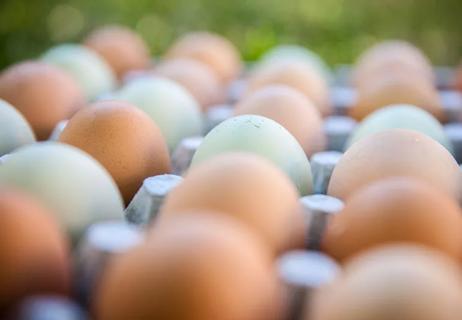Egg labels aren't all they're cracked up to be

We spend all this extra money to buy eggs from the best sources, but it’s hard to be sure about their quality.
Advertisement
Cleveland Clinic is a non-profit academic medical center. Advertising on our site helps support our mission. We do not endorse non-Cleveland Clinic products or services. Policy
One reason is because the labeling on egg cartons is bewildering. There are so many terms. Try to look them up on the U.S. Food and Drug Administration (FDA) or Department of Agriculture (USDA) websites, and you’ll find lengthy, confusing or loose definitions.
While egg labels can be helpful and effective, some tell you what the hens were fed and others tell you a bit about their environment. Still, others tell you how humanely they were raised.
But, you need to know what to look for. Registered dietitian Kristin Kirkpatrick, MS, RD, LD, explains what the most common labels mean — and don’t mean.
Organic: This means that hens received organic feed and were not raised in cages. When you eat organic eggs, you know the hens’ feed did not contain animal byproducts, synthetic fertilizers, sewage sludge, most pesticides, and other unsavory ingredients. Although antibiotics are rarely used in the egg industry, due to a regulatory loophole, it’s possible that organic eggs could come from hens given antibiotics. It’s worth checking into; although growth hormones are banned in poultry, antibiotics are not.
Also, an organic label says nothing about humane treatment. Hens’ outdoor access may be very limited, for example.
Advertisement
Omega-3 enriched: Egg yolks contain a small amount of omega-3, a heart-healthy fat. However, providing hens a diet high in omega-3, such as flaxseed or fish oil, can boost the omega-3 content in their eggs. However, according to the FDA, claims that omega-3 enriched eggs lower the risk of heart disease are unfounded, because eggs also contain cholesterol and saturated fat.
Free-range or free-roaming: This means that the hens producing the eggs were raised outdoors or given outdoor access. In addition to eating grains, these hens may forage for wild plants and insects. But the quality of the outdoor area, and how often the hens can access it, is not addressed. Hens living in crowded quarters may not budge when a farmer opens the doors once a day.
Cage-free: “Cage-free” is not analogous to “free-range.” It means that hens are not bound by cages and have unlimited access to food and water. Conditions on cage-free farms can be miserable. Overcrowded barns and poultry houses don’t give hens enough room to forage for plants and insects or dust-bathe. A new egg label, “barn-roaming,” may better describe those from hens confined to barns.
Pasture-raised: This means that the chickens can hunt on their own for larvae and grubs to eat. Since they hunt for this type of food, their eggs contain more healthy omega-3 fat compared to other chickens. Plus, the egg yolks are a dark yellow-orange color because they contain lutein, an antioxidant nutrient that’s also found in sweet potatoes and carrots.
Animal welfare approved (AWA): If you want your eggs to come from happy chickens, this is considered the gold standard. AWA deals only with family farms and has the strictest criteria for hens’ ability to live in their natural state. Farmers focus on promoting hens’ health and well-being rather than on treating diseases. Because this label combines organic feeding with humane living conditions and handling, you’ve covered all your bases.
Certified humane: If you can’t find AWA eggs where you live, look for eggs certified by Humane Farm Animal Care. This nonprofit organization inspects egg farms yearly to ensure that hens live unconfined, with enough room to nest, perch, take dust baths, etc. Hens have unlimited access to fresh water and wholesome feed, and benefit from humane handling.
If it’s hard to find AWA or certified humane eggs, get to know farmers within a 25-mile radius of your house. Ask if you can visit their farm, and go out and check out their chicken coops. If they say no, that’s a red flag.
“The current dietary guidelines don’t limit egg consumption as it did in the past,” Kirkpatrick says. “Eggs are a great source of protein.”
Another option would be to look into community-supported agriculture and have all your eggs delivered to your door from one farmer.
Advertisement

Sign up for our Health Essentials emails for expert guidance on nutrition, fitness, sleep, skin care and more.
Learn more about our editorial process.
Advertisement

Be mindful of how many eggs you’re eating, how you prepare them and the other sources of saturated fat in your diet

You can use applesauce, tofu, chia seeds and more in place of eggs

Pasture-raised and organic eggs have additional nutritional benefits

If you’re eating more than one egg per day, you might want to cut back

Keto can reduce blood sugar, but that doesn’t mean it’s right for everyone

Cravings are a natural response to hormonal changes, but giving into them may make you feel worse

Even small moments of time outdoors can help reduce stress, boost mood and restore a sense of calm

A correct prescription helps your eyes see clearly — but as natural changes occur, you may need stronger or different eyeglasses

Both are medical emergencies, but they are very distinct events with different causes